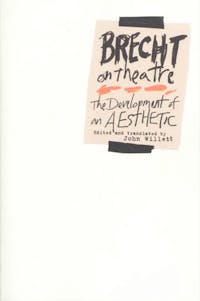Brecht on Theatre
The Development of an Aesthetic
 Download image
Download image
ISBN10: 0809005425
ISBN13: 9780809005420
Trade Paperback
352 Pages
$19.00
CA$26.00
This volume offers a major selection of Bertolt Brecht's groundbreaking critical writing. Here, arranged in chronological order, are essays from 1918 to 1956, in which Brecht explores his definition of the Epic Theatre and his theory of alienation-effects in directing, acting, and writing, and discusses, among other works, The Threepenny Opera, Mahagonny, Mother Courage, Puntila, and Galileo. Also included is "A Short Organum for the Theatre," Brecht's most complete exposition of his revolutionary philosophy of drama.
Translated and edited by John Willett, Brecht on Theater is essential to an understanding of one of the twentieth century's most influential dramatists.
Reviews
Praise for Brecht on Theatre
"Invaluable as an effort to clarify the stages and episodes of a career which has had enormous influence on world theatre . . . A source of genuine instruction, knowledge, enlightenment, even fun."—Harold Clurman, The New York Times Book Review


